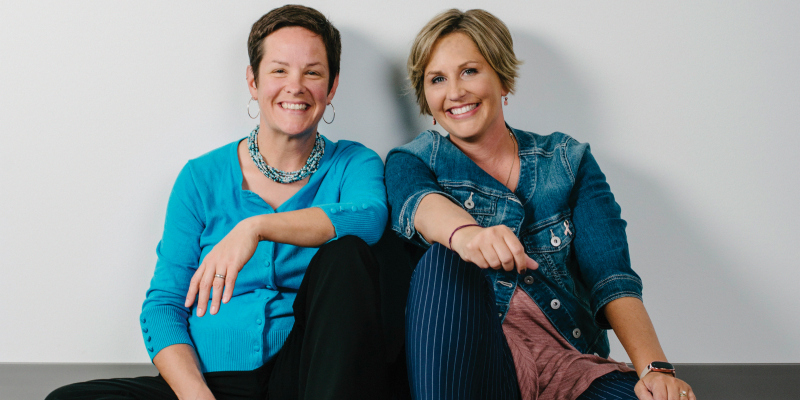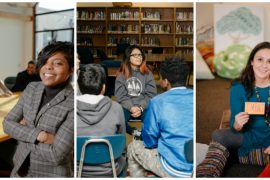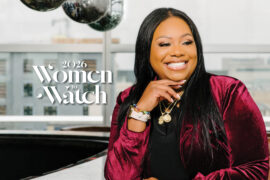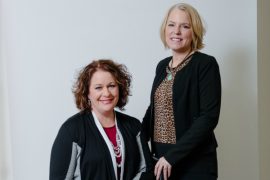By Emily McCluhan
Just ask.
– Stephanie Achten’s mantra during her breast cancer battle. “By simply asking friends and family who cared for me to assist me with food, trips to the doctor and walks, I was able to include them during a traumatic period in my life and help them feel needed.”
Live the Life You Love…Love the Life You Live
– Amy Frank’s sister gave her a necklace with this saying on it while she was recovering from breast cancer. “She knew how important it was to me during the fight. I plan to get it tattooed on my body as a reminder.”
It has been nearly a decade since Amy Frank and Stephanie Achten were diagnosed, both at age 35, with breast cancer. As devastating as that news and its painful aftermath were, both say surviving cancer changed their lives for the better.
“Life is shortened so quickly when you are diagnosed, and you immediately have to face that you might die. It forces you to figure out what is important and what isn’t; what battles to pick and where to move on, without judgement if possible,” Achten reflects.
Frank, a technology integration teacher in the Waunakee School District, remembers the day in 2010 she found a lump on her right breast. She was showering before putting on her wedding dress, a tradition for every anniversary. The mammogram a couple of weeks later didn’t show anything concerning because her breast tissue was too dense, a common outcome for younger women. A biopsy later confirmed the tissue was cancerous and an MRI lit up with the tumor spreading across her entire right breast.
“I opted for a double mastectomy because I have a family history of breast cancer,” Frank says. “During the surgery we found out that 16 of my 19 lymph nodes were cancerous.”
Frank’s cancer diagnosis was stage IIIC, meaning the cancer had spread to 10 or more lymph nodes, but not to other organs, which would’ve put her at a stage IV.
Frank says that telling her 6-year-old and 3-year-old kids was the hardest part.
“Having your children ask if mommy is going to die is a horrible question to answer,” says Frank. “So I said mommy has good doctors and we’re very hopeful.”
Through the long battle of chemotherapy and radiation, the bad news continued to pile up. The radiation treatments zapped her thyroid. Then Tamoxifen, the hormone therapy drug used to prevent recurrence of the cancer, created cysts on her ovaries and uterus, forcing more procedures to have her ovaries removed and the cysts removed from her uterus.
Achten, senior program director at Wisconsin School of Business, Center for Professional Development, faced a similar path when she was diagnosed in October 2011. When she visited a psychic that year, he asked her to bring something she was emotionally attached to. She chose a shirt her mom had worn. When the psychic held the shirt, she says he immediately commented that whoever wore the shirt needed to be checked for breast cancer. Achten often wore the shirt to remember her mom.
“My initial thought was, ‘yeah, whatever,’ but I did a self-exam in the shower a few days later and found a large lump on my left breast,” she says, remembering her shock. “I was freaking out until I could get in for the mammogram a couple of days later.”
Through the steps of mammogram, ultrasound and biopsy, she recalls the doctors telling her there was likely nothing to worry about since she was so young. When she received the results of the biopsy, she went alone to the appointment, thinking everything was fine. It was not. She had stage IIIA breast cancer indicating a tumor larger than 50mm or cancer that has spread to between four and nine lymph nodes. Achten faced the surgery, chemo and radiation battle in the coming months.
THE SURRENDER, THEN THE JOY
Before any of that could start, Achten and her boyfriend at the time, Gabe, decided to start another journey.
“We had been talking about having kids in the future when all of this happened and I did not want that taken out of my realm of possibilities,” she says.
Thanks to the Wisconsin Fertility Institute’s partnerships with Livestrong Fertility, Fertile Hope and Sam’s Fund, Achten was able to access discounted services for IVF treatments. The 23 eggs they retrieved resulted in 13 embryos that would wait for her to finish her cancer treatment.
The successful egg retrieval was a highlight in the long journey, but Gabe recalls it took time to appreciate those gifts and accept what may lie ahead.
“The scariest part and one of the dark gifts of the experience was surrendering to the experience,” says Gabe. “I knew that I was thankful to have Stephanie in my life although we had only been together less than two years. I gave in to not having any control over whether she would live or die. Once we both surrendered to this, we were able to find fun and joy in even the most challenging moments.”
One of those challenging times came during Achten’s radiation treatments in 2012.
“I was trying to keep the weight off during and after my chemo treatments and just stay healthy, so I biked to all of my radiation appointments,” she says. “It was a 90-degree day and very humid. Later that night in the shower I heard a loud ‘wah wah wah’ sound in my head. I dropped the soap and when I bent to pick it up, I couldn’t figure out why my hand wouldn’t work.”
Achten was having a stroke. The combination of her weakened body from the radiation and the overexertion had pushed her body to its limit. In the following months, she exchanged radiation treatments for physical and occupational therapy to rebuild her strength, speech and day-to-day functions. She eventually returned to radiation and breast reconstruction later that summer, and then tied the knot with Gabe in September 2012.
Through all of this, both women came to grips with the fragility of life. Frank says she went to “cancer college,” devouring books on breast cancer and how to battle it. One tip she immediately followed was to corral her support network. Neighbors helped transport her kids to and from activities, another mowed their lawn, giving the whole family time on the weekends to create memories.
“I never really focused on my survival rate but in one of the books it said I had a 50/50 chance at being alive in five years based on the type of cancer I had,” says Frank. “I knew I needed to find the things I could control.”
So, she met with a dietician to find the best way to stay strong and healthy during the long slog of chemotherapy treatments. She visited a physical therapist to learn how to manage the painful arm swelling from her lymphedema, a result of having so many lymph nodes removed. And she started a gratitude journal to remind her of all the sunshine in her life, especially her kids.
When Achten and her husband reflect on those early days after her diagnosis, they remember laughter through the fear and stress.
“The first thing Gabe said when I asked what he remembers about the whole thing was that we had a lot of fun. Cancer was just another thing to do. Life didn’t stop,” she says smiling.
Before her mastectomy surgery, Achten and Gabe wrote on her right breast, “Not this one,” to get a laugh out of her doctor. She rallied friends and family through her Caring Bridge page to join them at the hospital on her surgery day to support Gabe. The 20 people that showed up kept her belly-laughing before and after the procedure.
She pulls out her Caring Bridge book, a printed version of all her posts and all the comments and photos shared to her Caring Bridge page. Her fingers trace across the faces and she smiles as she shares memories of shaving heads and friends doing yard work or painting their nails blue (her favorite color).
Gabe notes that during Achten’s chemo treatments she loved having visitors but didn’t have the mental and emotional capacity to set good boundaries. He acted as a sort of gatekeeper to make sure she had a good balance of support and rest.
“There were times when it would cheer her up and times when she just needed to go upstairs and rest or sleep. I had to be able to see what she needed before she could. I had to be those parts of her that were temporarily unavailable,” he says.
FINDING SUPPORT FROM OTHERS
Achten and Frank also found inspiration and support through local groups like Gilda’s Club in Middleton, a cancer support and education center. Frank joined First Descents, an organization for cancer survivors under 40 that offers adventure trips.
“I’m a rock climber so I was able to find a trip to New York with First Descents, just pay my airfare and spend a week rock climbing with some amazing people,” Frank says.
Her son attended Camp Kesem, an organization for kids whose parents had cancer and is staffed by volunteer college students. Frank says the support of these groups is amazing, but it’s hard to lean on it sometimes because not all who fight survive. Her eyes shine with tears as she remembers when her friend lost her battle with breast cancer and how the volunteers from Kesem came to the funeral because her son had attended the camp.
“It’s an amazing organization that just takes care of people. I was always looking for things to help me like that,” she says.
As these women fully integrate into the world of survivorship, they’ve adjusted their focus from seeking help, to paying it forward and helping others. Achten joined Breast Cancer Recovery’s Infinite Boundaries program for a retreat in the Apostle Islands during her cancer journey and is now a facilitator with the group. Frank enjoys supporting local events like Wine, Women & Shoes, a fundraiser for UW Carbone Cancer Center. She also finds joy in helping others and sharing what she learned. When Frank found out that her fellow teacher, Jacqueline Wells, had breast cancer, she jumped into action.
“When I expressed a wish to receive cards of support on my treatment days, she organized all the materials to make it convenient and easy for colleagues to send me a note,” Wells says. “During my eight chemo treatments, I always had 30 to 40 cards to open.”
What Wells appreciated most was how Frank supported her without pity, answering all of her questions honestly.
“She told me one day I would help other women. I had no idea how true her words would be,” Wells says. “Before I reached my one-year cancer anniversary, I had reached out to help four women diagnosed with cancer and talked to two women who had biopsies. Maybe the best way to thank Amy is to continue to pay it forward.”
On the other side of cancer, Frank and Achten still confront lingering aspects of the disease like continued appointments with their oncologists. Frank still takes Tamoxifen (a drug both women call “nasty” because of the ugly side effects like early menopause, the potential for crystals on their retinas and cysts on other female organs). Achten and her husband tried to move ahead with their frozen embryos with Gabe’s sister-in-law as a surrogate but had no luck. In 2015, they fostered, and eventually adopted, Achten’s niece so they are a family of three, but are thinking of trying for their own.
UNEARTHING THAT INNER STRENGTH
When asked what she learned from cancer, Frank doesn’t hesitate.
“I learned that people are genuinely good,” she says. “There’s so much negativity out there, but I just could not believe the people that rallied around us. Everyone is deal- ing with something. If we just help each other out a little bit more, the world would be a better place.”
Both women admit they learned they were stronger than they thought but know now they must listen to their bodies and take care of themselves. For Frank, that meant trading in her classroom teacher role in Waunakee last year to become the Tech Integration teacher, which means more flexibility and fewer papers to grade at home, giving her more time with her family.
While the journey was stressful, terrifying and at times included a lot of tears in the shower, what was gained is perspective.
“I’m always trying to improve myself, whether that means physically, mentally, professionally or as a mom,” says Achten. “I’m still the same person, but I think I’m a wiser person. I think of cancer as a gift.”
Achten admits that sounds weird to most people and she’s had to hold back on saying it to friends who are recently diagnosed, but she believes her diagnosis helped her take stock of her life and keep a positive outlook.
Frank agrees that while she wouldn’t wish cancer on anyone, it changed her life for the better and is a good reminder to check herself when she feels unbalanced.
Neither woman uses the word “remission” because they say that makes it feel like they are waiting for the disease to come back. Instead, they face the future filled with love and surround themselves with both the family they were given and the family they chose. A reminder to us all to appreciate the light of life.





Comments are closed.